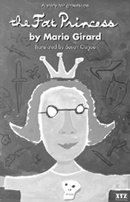
The Fat Princess
Mario Girard
Translated by Susan Ouriou
XYZ Publishing
$19.95
paperback
148pp
0-9683601-9-X
For a child of four, if indeed that is what she is, Charlotte is precocious, with tremendous powers of imagination and description. She freely brags about her ability to repeat absolutely everything she hears, though malapropisms and neologisms indicate that when she can’t assimilate a word or concept, she invents one to take its place. For example, she visits “an ophthewallogist … He checks to see whether his patients can read words oph the wall.”
Girard respects a child’s storytelling mode, and The Fat Princess doesn’t really adhere to any recognizable dramatic structure. Though it nods at chronology, incidents and characters arise in a flow whose primary determinant is free association.
Comparison with another contemporary novel from the point of view of a highly imaginative young girl, Nicholson Baker’s The Everlasting Story of Nory, makes it clear, however, that whoever is narrating The Fat Princess is not really a child character. Baker’s book is in the third person, but adheres wholly to Nory’s point of view and voice. Girard’s meanders between the child’s perspective and the author’s. It’s not just that Charlotte is familiar with big words or big ideas. She admits that she can’t read or write, so her father, a novelist by the name of Mario Girard, is writing it for her, which automatically means that our narrator is some sort of composite. At various points, “the author” actually intrudes with a footnote, including one in which he admits, after a particularly perspicacious passage, “I realize that I have somewhat overstepped my character’s parameters here. I promise not to do it again. Author’s note.”
In other words, digressions or passages of sophistication beyond the remotely credible (this is the only one apologized for, but not by any means the only one) are not laziness, but postmodern electric shocks meant to keep the readers vigilant to the implausibility of the tale. They also poke gentle fun at a romanticized vision of childhood as a wise and primitive state, a time of true knowledge prior to the corruption of civilization and education.
These layers are folded on themselves again through Girard’s use of innumerable puns. If this book is short, it is partly because so many of the words have more than one function. On the subjects of the English language, safety for the urban child, and her own dietary restrictions due to diabetes, for example, Charlotte offers a single admonition: “…you should never put anything in your mouth that comes from strangers no matter how tempting or sweet.” Even Charlotte’s own name is an ironic twist: she shares it with a dessert, yet sweets are strictly off limits. One hopes that translator Susan Ouriou had fun with such wordplay; certainly its rendering in English would have been a formidable job.
The Fat Princess is a lot of fun to read. The downside to all this literary playfulness, however, is an undercurrent of frustration. The reader is never moved. The central character is amorphous, neither child nor adult nor any other sort of being one might actually know, and never faces any trial or other momentous event, the sort which crystallizes a character through her reactions and thus can help bring the reader onside emotionally. Furthermore, one gets the hint from the arch authorial intrusions and other suggestions of narrative dissembling that we’re not getting the “whole” or “true” picture anyway. None of these is necessary to make a good book, but their absence does make for a cerebral one: The Fat Princess is more brain candy than a treat for the heart. mRb






0 Comments